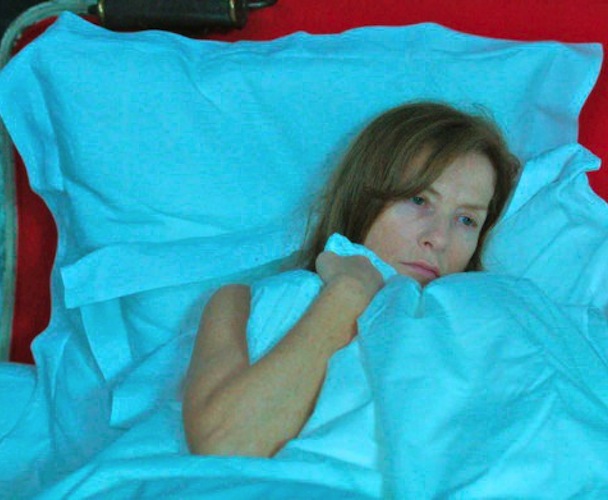Film Review: “Abuse of Weakness” — Encounter With a Monster
- Writer-director Catherine Breillat’s Abuse of Weakness is a fascinating, nicely restrained look at what in retrospect was a parasitic relationship.
Boston Area Film Schedules – What is playing today, Where and When
By Betsy Sherman
Catherine Breillat, one of the boldest voices in European cinema, returns with the compelling Abuse of Weakness (Abus de faiblesse), running at the Brattle Theatre in Cambridge, MA from August 22 to 25. The director-writer adapted her autobiographical book of the same name, which recounts the aftermath of the 2005 stroke that paralyzed her left side and her subsequent association with well-known con man Christophe Rocancourt. Known for her untraditional casting choices, Breillat offered Rocancourt a role opposite Naomi Campbell in a project that ultimately fell through. Then, as he and Breillat collaborated on a screenplay of his life story, Rocancourt bilked the filmmaker out of approximately 850,000 euros. She accused him of taking advantage of her diminished condition, and he was tried and convicted under the French statute outlawing “abuse of weakness.”
Isabelle Huppert, as filmmaker-author Maud Schoenberg, immediately rises to the physical challenge of the role. Maud, blissfully nude under the sheets, succumbs to a series of violent contortions: she’s suddenly been betrayed by brain and body. In the hospital, and during rehabilitation, this feisty woman is completely dependent on others. But once she’s back in her funky, book-filled apartment, her creative juices begin to flow. Laughing gleefully as a brutish-looking criminal boasts of his swindles on a talk show, she decides she’s got to put him in a movie.
The rapper and (significantly) professional poker player Kool Shen aces his first major acting role as Vilko, the crook who’s been savoring his recent celebrity and is eager to be a movie star. In the initial meetings, Vilko reacts to Maud, who’s unlike any woman he’s ever met, with a good deal of masculine preening. Over time, the two become close in a way that’s touching: the relationship isn’t sexual, but it’s affectionate and by necessity physical. Maud walks with a cane, can’t use her left hand, and has trouble with balance. Vilko gets used to carrying her, and she gets used to being carried by him.
As the story unfolds, one innocuous object becomes the focal point: Maud’s checkbook. Vilko has debts. He asks Maud for a loan. She writes a check. He needs her to go in on a business venture with him. She writes a check. Repeat. Even after her good hand has been fractured, she torturously signs that check. Breillat presents this slow drain not as some kind of evil hypnosis, but as a paradox. Maud’s used to being a director, and we see her many decisions—in the pre-production for the film, in the renovation of her home and garden, even in the crafting of the coolest, toughest-looking Velcro-fastened boots ever made. Vilko is like water that deliberately wears away at the surface of a rock. Huppert’s expression is vacant as her hand makes its obligatory scrawl.
Abuse of Weakness is a fascinating, nicely restrained look at what in retrospect was a parasitic relationship. After her stroke, Breillat made a pair of films based on fairy tales. It will be interesting to view them again after learning about her encounter with a real-life monster.
Betsy Sherman has written about movies, old and new, for The Boston Globe, The Boston Phoenix, and The Improper Bostonian, among others. She holds a degree in Archives Management from Simmons Graduate School of Library and Information Science. When she grows up, she wants to be Barbara Stanwyck.

